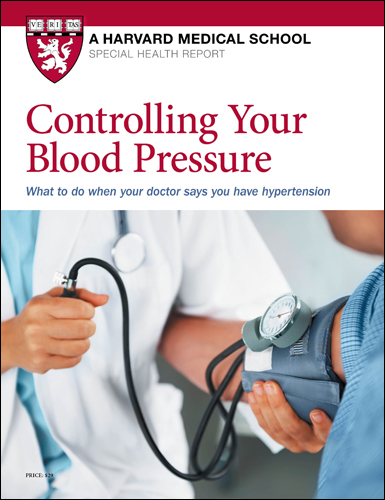Your brain on high blood pressure
High blood pressure is not just a heart problem. It also can raise your risk for strokes and cognitive decline.

People think of high blood pressure as a heart problem, as it can raise your risk for a heart attack. But it also can affect your brain health.
Blood pressure is the most important factor contributing to brain injury, often in the form of a stroke, according to Dr. Steven Greenberg, a professor of neurology at Harvard Medical School. "Keeping blood pressure low can make brain injury less likely, help conserve brain function, and perhaps slow the natural decline in cognitive function."
Blood pressure and strokes
High blood pressure (hypertension) accelerates the process of atherosclerosis (the buildup of fatty plaque inside artery walls) in both the neck and the brain. The impediment can slow blood flow dramatically, or a blood clot can suddenly form on top of the plaque, cutting off the supply of oxygen and nutrients to part of the brain.
In addition, hypertension increases stroke risk in several ways. It makes you more likely to develop atrial fibrillation, which allows small clots to form in the heart; these can escape and travel to the brain, where they can cause a stroke by blocking blood flow.
These types of strokes tend to affect both medium-sized and large arteries, usually leading to recognizable symptoms, such as sudden weakness on one side of the body or face, difficulty speaking, or inability to walk.
High blood pressure also can damage the smaller arteries in the brain. When blood flow in one of these arteries slows too much or stops altogether, the result can be a small stroke, often referred to as a "silent" stroke because it usually causes no immediate symptoms. Such strokes often occur in multiple parts of the brain.
Cognitive problems commonly develop after a major stroke or repeated small strokes. You might develop problems with learning and retaining new information, short-term memory, and even memory of names, faces, and familiar places.
"This is why prevention is so important," says Dr. Greenberg. "By addressing high blood pressure now, you can hopefully avoid large or small a strokes and the memory damage that often comes with them."
Conserving brain function
Besides protecting the brain from strokes, lowering high blood pressure can help conserve existing brain function, according to a 2019 study in the journal Circulation.
The study included 199 adults ages 75 and older, with a systolic blood pressure value (the top number in a reading) of 150 mm Hg or higher, which is defined as Stage 2 hypertension (see "Blood pressure categories").
Their brain scans showed abnormalities in the brain's white matter, which contains nerve fibers that send signals from one part of the brain to another. Such white matter changes, which reflect damaged small blood vessels, have been linked to a propensity for thinking and memory problems.
Half of the participants were given medication to lower their systolic pressure to 145 mm Hg, while the others got drugs to reach a goal of 130 mm Hg or lower. Three years later, brain scans showed fewer new white matter lesions in people whose systolic pressure was 130 or lower than in those whose target was 145.
Everyone's cognitive skills naturally decline over time. But reducing high blood pressure may slow the process.
A study in the May 19, 2020, issue of JAMA looked at 12 studies involving more than 92,000 people with Stage 2 hypertension. All the studies tested participants' cognitive skills, such as concentration, decision making, and learning new information.
At the follow-up (which lasted about four years, on average), the risk of cognitive impairment was about 7% lower among people who took blood pressure drugs compared with those who didn't.
Blood pressure categories |
|||
|
BLOOD PRESSURE CATEGORY |
SYSTOLIC mm Hg (upper number) |
DIASTOLIC mm Hg (lower number) |
|
|
Normal |
Less than 120 |
and |
Less than 80 |
|
Elevated |
120 – 129 |
and |
Less than 80 |
|
High blood pressure (hypertension) Stage 1 |
130 – 139 |
or |
80 – 89 |
|
High blood pressure (hypertension) Stage 2 |
140 or higher |
or |
90 or higher |
|
Hypertensive crisis (consult your doctor immediately) |
Higher than 180 |
and/or |
Higher than 120 |
The right number
Current medical guidelines place elevated blood pressure at 120/80 to 129/80 mm Hg and normal as less than 120/80 mm Hg. Which range is best for protecting your brain?
"Because the definitions of normal, elevated, and high blood pressure have gradually dropped over the decades, the recommendation is trending in the direction that the lower the number, the better," says Dr. Greenberg. "Just like with the heart, the best way to protect your brain from high blood pressure is to drive your number down if it's high and keep it as close to a normal level as possible."
Image: © Shidlovski/Getty Images
About the Author

Matthew Solan, Executive Editor, Harvard Men's Health Watch
Disclaimer:
As a service to our readers, Harvard Health Publishing provides access to our library of archived content. Please note the date of last review or update on all articles.
No content on this site, regardless of date, should ever be used as a substitute for direct medical advice from your doctor or other qualified clinician.
















